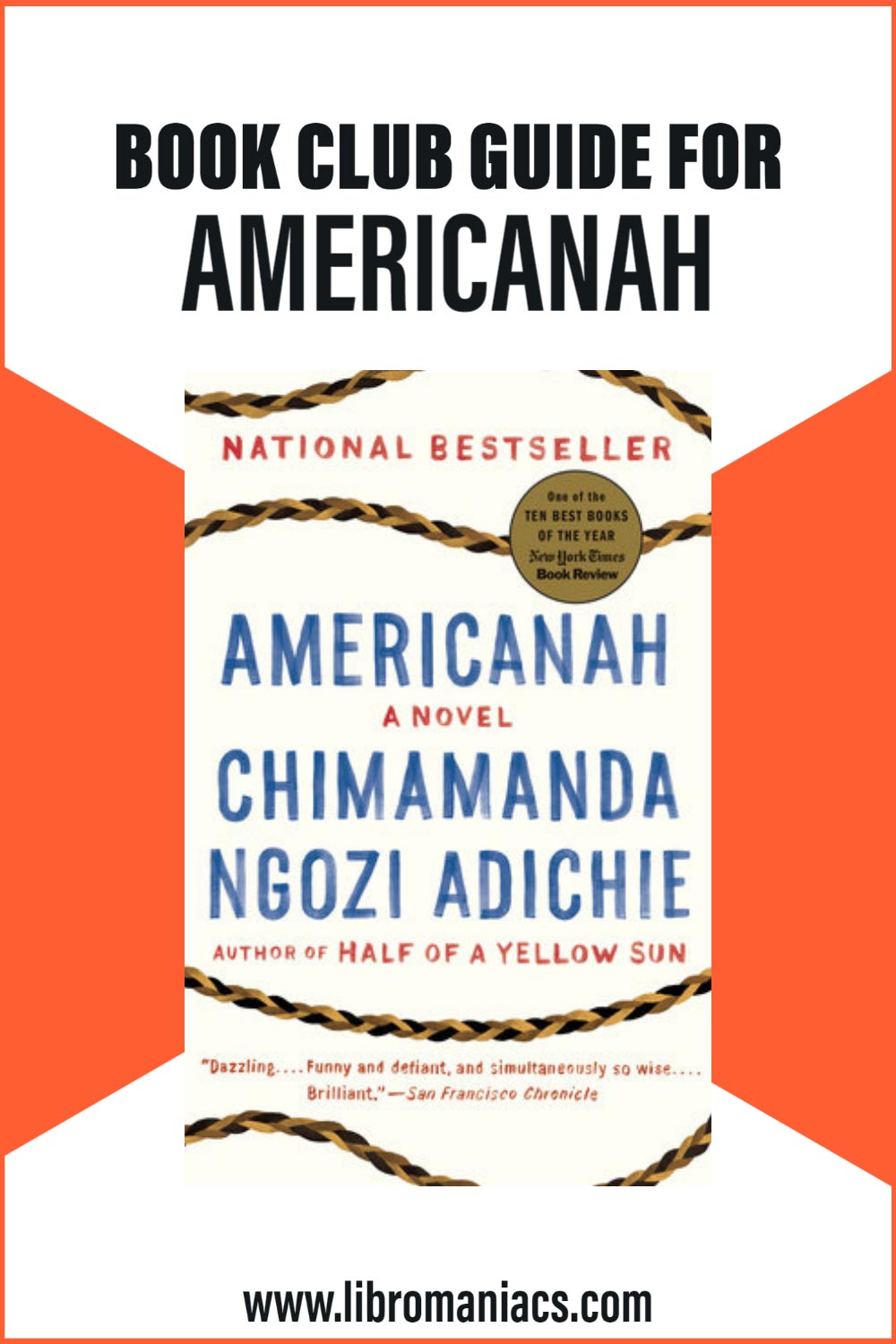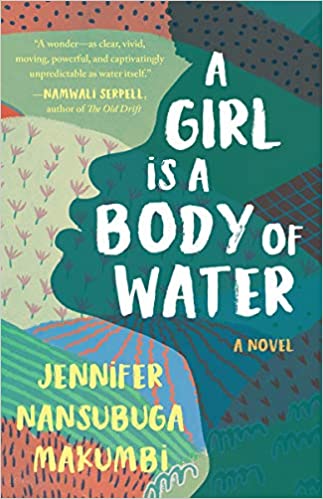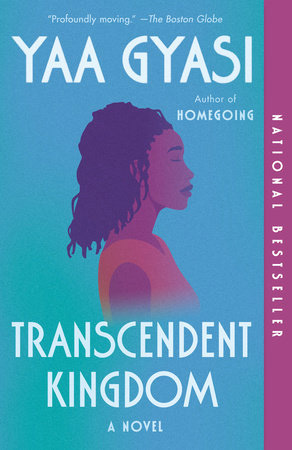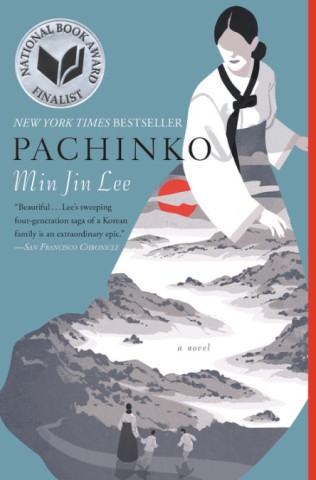Chimamanda Ngozi Adichie’s National Bestselling novel Americanah takes readers on a journey across decades and continents. The book begins with two young lovers growing up in Lagos, Nigeria, but they are separated in their search to follow their dreams. Each has to confront their identity as the context that surrounds them changes. Our Americanah book club questions delve into the themes Adichie is exploring in this novel: love and loss, changing identities, and racism.
Americanah is a heartfelt book that follows Ifemelu and Obinze from their teenage years into their adult lives. They experience culture shock, connection, hardship, and the shifting context of personal and societal identity. Our Americanah discussion guide will help your book group stimulate conversation and navigate the big topics around identity– from culture to class, race, nationality, femininism and immigration.

In our Americanah discussion guide, you’ll find ten thought-provoking questions to engage your book club, a synopsis of the book, and a collection of selected reviews that offer different perspectives to allow you to gain a glimpse into other ways the book has been viewed. If you enjoyed reading this book, then read to the end of our book discussion guide to find three books like Americanah for you to check out.
(This article contains affiliate links. This means that if you choose to purchase, I’ll make a small commission.)
Americanah Synopsis
Americanah, Chimamanda Ngozi Adichie
Ifemelu and Obinze are young and in love when they depart military-ruled Nigeria for the West. Beautiful, self-assured Ifemelu heads for America, where despite her academic success, she is forced to grapple with what it means to be Black for the first time.
Quiet, thoughtful Obinze had hoped to join her, but with post-9/11 America closed to him, he instead plunges into a dangerous, undocumented life in London. Fifteen years later, they reunite in a newly democratic Nigeria, and reignite their passion—for each other and for their homeland.
10 Americanah Book Club Questions
- “I did not think of myself as Black and I only became Black when I came to America.”
When Ifemelu moves to America, she is forced to look at herself differently because of how American society views her. How does this experience change Ifemelu’s way of viewing herself? And how does this make her view of American racism unique? - When Ifemelu and Obinze are separated, each undergoes very different journeys that affect their identities and how they view the world – Ifemelu’s as a Black woman in America and Obinze’s as a Black man living undocumented in England. How do these experiences change the way they view the world? And how do these experiences change their dynamic when they are reunited?
- The book is told in a nonlinear format beginning with present-day Ifemelu before jumping back to Ifemelu’s adolescence. The book also switches between Ifemelu’s and Obinze’s perspectives. How did these formatting choices affect your reading of the book?
- When we are introduced to Ifemelu, we learn a lot about her mother’s religious nature. How does this upbringing affect her relationship with religion as a child and as an adult? Does faith continue to come up throughout the book? In what ways?
- Books are an essential part of Ifemelu’s and Obinze’s relationship when they first meet. Obinze, in particular, is very interested in reading American books. How do literature and media affect their view of American culture? Did you recognize any of the books they talk about?
- “I think you are a self-sabotager,” Ginika said. “That’s why you cut off Obinze like that. And now you cheat on Curt because at some level you don’t think you deserve happiness.”
Ifemelu has several romances throughout the book, beginning and ending with Obinze. Do you agree with Ginika? Do you feel that Ifemelu struggled with her romantic relationships because of Obinze? Will Ifemelu and Obinze’s relationship continue to work after the novel ends? - Throughout the book, we see articles written by Ifemelu on her experiences with race in America. How did the articles affect your reading experience? Did you find them helpful? Distracting? Crucial to conveying the themes of the story?
- “Don’t we all, in the end, write about love? All literature is about love. When men do it, it’s a political comment on human relations. When women do it, it’s just a love story. So, although I wanted to do much more than a love story, a part of me wants to push back against the idea that love stories are not important. I wanted to use a love story to talk about other things. But really in the end, it’s just a love story.” -Adichie Interview with The Guardian.
What did you think about the love story in this novel? Do you agree with Adichie’s statement? Did you find the love story a distraction from the rest of the book or the prominent force that pulled the story together? Or neither? - Americanah was published in 2013. In the book, we see the context of being Black in America during the Obama administration. Did you feel the context was different reading the book during the Black Lives Matter movement? Are there elements that feel outdated, or was the content even more relevant today?
- Have you ever spent time studying or working in another country? Did you experience culture shock? What did it feel like to return home?
Selected Reviews for Americanah
“It was LONG – probably longer than it needed to be – and a revolving door of random characters come and go, and so it feels a tad like a non-fiction commentary on race and identity padded out into a love story. However, I feel as though its length is part of the art: it’s a person’s life, and we as readers must endure the peaks and troughs of reality just as the protagonist does.”
“The characters are all fleeting constructions of their own imaginations, their own desire for survival, their own need for validation. They are constantly evolving, changing, reassessing, adapting, morphing into the people that they become, always a little short of the people they aspire to be. The world, in all its cruelty and randomness, is constantly forcing them to bend and bend and bend until some break in two and others rebound even more forcefully.”
“The two main characters – especially Ifemelu – were barely likeable after her move to America, all the other characters (especially the Americans and “nouveau riche” Nigerians) were very one-dimensional.”
“Immigrants usually exist outside of class (especially at first), they are in the class of their own, because the locals can’t tell where to place them – their accents are just foreign accents, their education usually means nothing and neither does their family background. When Ifemelu arrives in the US from Nigeria, her middle class identity is taken away from her and she is given a new one – that of a Black person. From now, whether she likes it or not, it would be her first identity, anything else will come after that.”
3 Books like Americanah
If you are more interested in exploring Blackness, race and color as a construct, we have book club guides for Caste (Isabel Wilkerson) and Born a Crime (Trevor Noah).
For more on the immigrant experience, try How Not to Drown in a Glass of Water or Solito.
If you enjoyed reading Americanah, you should check out more of Chimamanda Ngozi Adichie’s books, such as Purple Hibiscus and Half of a Yellow Sun. Check out the list below for more books about culture, identity, immigration, and love.
A Girl is a Body of Water, Jennifer Nansubuga Makumbi
Set in Uganda, this story follows Kirabo from her childhood living with her grandparents, years attending school, and finding her place in adulthood. The story explores the complex emotions of growing up, heartbreak in friendship, love, class, and the women who make us who we are.
Transcendent Kingdom, Yaa Gyasi
This powerful novel tells the story of Gifty and her family, who immigrated to the United States from Ghana. Through Gifty, we see her families struggle with addiction and depression as they face incredible loss, as well as, strength and determination as Gifty works to find answers. It is a profound story of faith, grief, and love.
Pachinko by Min Jin Lee
This epic tale of love, betrayal, displacement, and a deep longing to belong. If you are a fan of historical fiction, check out this sweeping story set throughout the 20th century in Japan and South Korea. Beginning in the early 1900s, Sunja finds herself betrayed by love and takes a chance that leads her away from home, a decision that will affect her family’s story for generations.
Pachinko was also a National Book Award finalist and we have a discussion guide for Pachinko.
Have a listen on Audible. Try audio books for free for 30 days.
Share these Americanah book club questions with your friends:





